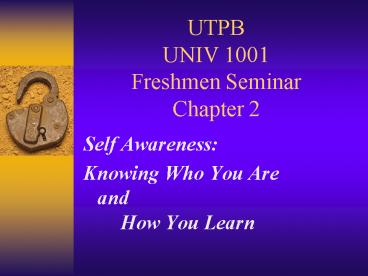UTPB UNIV 1001 Freshmen Seminar Chapter 2 PowerPoint PPT Presentation
1 / 29
Title: UTPB UNIV 1001 Freshmen Seminar Chapter 2
1
UTPB UNIV 1001Freshmen Seminar Chapter 2
- Self Awareness
- Knowing Who You Are and How You Learn
2
Is There One Best Way to Learn?
- Learning Styles
- A particular way in which the mind receives and
processes information
3
- Famous People
- Winston Churchill failed 6th grade
- Abraham Lincoln demoted in military
- Louis Pasteur poor student in chemistry
- Walt Disney fired for no good ideas
4
How Can You Discover Your Learning Styles?
- Learning Styles Inventory
by Barbara Soloman - Active/Reflective
- Factual/Theoretical
- Visual/Verbal
- Linear/Holistic
5
Multiple Intelligences Theory by Howard Gardner,
Harvard professor
- 1. Verbal-Linguistic Intelligence
- 2. Logical-Mathematical Intelligence
- 3. Bodily-Kinesthetic Intelligence
- 4. Visual-Spatial Intelligence
- 5. Interpersonal Intelligence
- 6. Intrapersonal Intelligence
- 7. Musical Intelligence
- 8. Naturalistic Intelligence
6
Personality Spectrum by Joyce Bishop
- Organizer - efficient, dependable
- Adventurer - flexible, dynamic
- Giver - caring, sensitive
- Thinker - analytical, thorough
7
Personality Spectrum Group Activity
- Form a group with people who match your
Personality Spectrum - Draw and complete this chart as a group
(Your Spectrum)
Strengths Growth Areas
Stresses Careers
8
Example for Giver Group
Giver
Strengths Growth
Caring, giving sensitive good people skills
Trouble saying no too sensitive setting boundaries
Stresses Careers
Conflict Insensitive people
Teacher, counselor Doctor, nurse Social work
9
What Are the Benefits of Knowing Your Learning
Styles?
- What do you think?
10
Active Learners / Bodily-Kinesthetic /
Interpersonal / Adventurers
- Study in a group
- Think of practical uses of the material
- Pace and recite while you learn
- Act out material or design games
- Use flash-cards with others
- Teach material
11
Reflective Learners / Intrapersonal/Logical-Mathem
atical / Thinkers
- Study in a quiet setting
- Stop periodically while reading and think
- Think about why material is important
- Write short summaries of what material means to
you
12
Factual / Organizers
- Ask instructor how concepts apply
- Ask for examples of concepts
- Brainstorm examples with classmates or by
yourself - Think about how theories connect with real world
13
Theoretical learners Logical-Mathematical
- Think of theories that link facts together
- Read directions entire test questions
- Look for systems and patterns
- Analyze material
14
Visual-Spatial
- Draw time lines
- Make diagrams and graphs
- Organize and color-code notes
- Draw arrows in notes to connect facts
15
Verbal-Linguistic (may be interpersonal also)
- Rewrite notes
- Outline chapters
- Talk about what you learn.
- Read textbook and highlight
- Recite information
- Write scripts and debates
16
Linear Learner
- If instructor jumps from topic to topic, clarity
gaps in notes with instructor or classmate - Rewrite notes according to your logic
- Outline the material
17
Holistic learners
- Preview chapters
- Learn in fits and starts
- Immerse yourself in
one subject at a time
18
Musical-Rhythmic
- Play instrumental music while studying
- Create rhymes out of vocabulary words
- Beat out rhythms when studying
- Listen to music for study breaks
- Write a rap about your topic
19
Naturalistic learners
- Relate information to nature
- Study outside when practical
- Explore subjects related to nature
- Take breaks with something in nature
20
Benefits of Knowing Your Learning Style
- Make more focused career decisions
- Be more successful on the job
- Target areas for improvement
21
Self-Perception
- Sources of negative self-images
- Critical parents
- Negative instructors
- Unrealistic expectations
- Magazines and other media images
22
- Improving self-image
- Believe in yourself
- Talk to others who you trust
- Take time for yourself
- Look at what you do well
23
Finding Your Interests
- What areas of study do I like?
- What activities make me happy?
- What careers seem interesting to me?
- What kind of daily schedule do I like?
- What type of home and work environment do I
prefer?
24
Habits
- Bad habits
- prevent you from reaching your goals
- Good habits
- have positive effects on your life
25
Evaluate Your Habits
- 1. Admit to negative habits
- 2. Recognize habit as troublesome
- 3. Decide to change
- 4. Start today
- 5. Change one habit at a time
- 6. Reward yourself
- 7. Keep it up
- 8. Dont get discouraged
26
Abilities
- What have I always been able to do well?
- What have others often praised about me?
- What do I like most about myself?
- What is my learning-style profile?
- What are my accomplishmentsat home, school, and
work?
27
Limitations
- Dont ignore or dwell on them
- Facing limitations
- Working to improve limitations
28
Exploring Potential Major
- Take a variety of classes
- Dont rule out classes
- Spend time getting to know yourself
- Work closely with your advisor
- Take advantage of other resources
- Develop your critical-thinking skills
29
(No Transcript)

